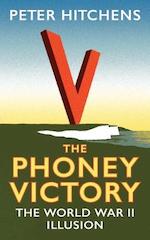Peter was in a packed New York Times Main theatre with Ruth Wishart to discuss his new book The Phoney Victory in which he attempts to dismantle the idea that WW2 was a ‘good war’ for Britain and suggests that the triumph over Hitler may have made Britain too easily seduced by the idea of war.
Peter, having witnessed atrocities in Ceausescu’s Romania and when Gorbachev let the KGB loose in Lithuania, has since become very antiwar. That’s not to say he thinks defensive wars are bad, but he argues that Britain did not go into WW2 for defensive reasons, and went in at the wrong time, unprepared and for the wrong reasons, and it cost Britain greatly.
War has become popular he says, citing Serbia and Kosovo, Afghanistan and Syria. People on the ground know nothing of the consequences because unlike in the early 20th century they did not see them and most people have not seen what a bullet does to a human head. I asked him why the modern British state has been so pro-war and pro-intervention and he said that to modern politicians war is like a video game.
As a journalist Peter has always shied away from covering war and says he was filled with anger on seeing soldiers return from Afghanistan. He predicts that Libya will turn out to be the most damaging of recent Western wars but didn’t expand on the point. He also noted that in Syria we would be fighting on the side of people that we would arrest if they were in Birmingham.
 Peter was brought up on a diet of playing soldiers, of the good fight, of rations, of broken buildings and a defeated landscape where people, having lost so much, clung to the spiritual hope that they had not sacrificed for nothing having fought the Germans. Peter points out that a lot of WW2 is based around mythology, and the book examines that. He says this has won him no favours among the media class.
Peter was brought up on a diet of playing soldiers, of the good fight, of rations, of broken buildings and a defeated landscape where people, having lost so much, clung to the spiritual hope that they had not sacrificed for nothing having fought the Germans. Peter points out that a lot of WW2 is based around mythology, and the book examines that. He says this has won him no favours among the media class.
He wrote The Phoney Victory because he said he was tired of being called an ‘appeaser’. “A country which hides from its own past will mess up its present,” says Hitchens. And if the glory of war was imprinted onto the men who run our government from an early age, are they more likely to make brutal decisions about the lives and welfare of people far away, especially since they don’t see the consequences in front of their eyes?
Chamblerlain, known today as an appeaser of Hitler, in fact built up the navy and air force which were instrumental in making an invasion of Britain impossible. Britain and Germany had quite different aims with the bombings from the air, says Hitchens. Germany was trying to demoralise the nation to the extent where Britain would agree to peace. Hitler’s territorial aims were always primarily directed towards the East. Britain, however, had a policy to ‘de-house’ the German population and targeted women, children and densely packed working class areas – Dresden wasn’t the only victim of this campaign, there were other small non-industrial places such as the horrors Britain inflicted on Darmstadt. British airmen were shown photographs prior to raids of factories but the true targets were people. Hitchens says he is unpopular in the media as a whole for pointing out British atrocities against German women and children but says that “hellish things were done by our side too, not just the Nazis.”
History, he says, is often about omission. Grisly truth glossed over or left out. His book, he says, “is not a happy one.”
- FILM REVIEW: Sometimes I Think About Dying (2024) - 10th March 2024
- TWO FINE DOCUMENTARIES: High and Low and Made in England, the Films of Powell & Pressburger - 10th March 2024
- FILM REVIEW: Frank Capra: Mr America (2023) - 4th March 2024










